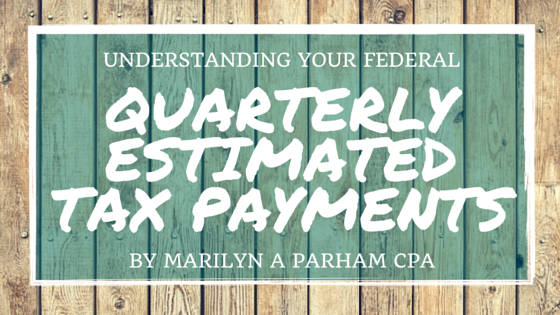If you are new to business, paying your U S Taxes can be a little intimidating. It's easier as an employee and they withhold the right amount from each of your paychecks. Sure, they take a large amount away, but you have a lot more left, so it doesn't seem like a big deal.
Who Needs to File Quarterly Estimated Tax Payments?
Business owners who are trying to keep tabs on their earnings and expenses see things differently. Even if they make a lot of money in any given year, the taxes the IRS requires may seem like a large burden. To lessen the impact of your year-end tax obligation, the IRS established a system of quarterly payments that spreads the amount over the four quarters of the fiscal year.
For many business persons, these quarterly estimates are required if you intend to avoid the penalties for not filing them. However, not everyone in business is required to file these quarterly tax estimates. The primary thing that determines this is: Will you have to pay more than $1000 in taxes for the coming year? If so, you should make estimated tax payments each quarter to avoid underpayment penalties. Even company employees who will owe more than a $1000 in addition to their withholdings should file quarterly estimates.
When Does a Quarter Not Equal a Fourth?
Even though these are referred to as quarterly estimates, be aware that the due dates for filing do not follow a standard calendar quarter.
- First quarter estimates are due April 15th for period ending Mar 31.
- Second quarter estimates are due June 15th for period ending May 31.
- Third quarter estimates are due September 15th for period ending Aug 31.
- Fourth quarter estimates are due January 15th for period ending Dec 31.
Notice there is only two months between the 1st and 2nd quarters and four months between the 3rd and 4th quarters?
How Do I Know How Much I Should Pay?
The IRS provides a worksheet to help you determine if you need to file quarterly, and if so, how much should you pay each quarter.
Find the link in IRS Publication 505. Whether you use the worksheet or not you should make these quarterly payments if you expect to owe more than $1000 in taxes.
If you use a tax preparer to file your taxes, they will usually provide vouchers to use when sending in your quarterly estimates to the IRS. The amount they suggest paying will be based on your previous year's income.
However, if your income fluctuates from quarter to quarter or you expect your income to rise or fall significantly in the coming year, you may choose to pay a different amount based on what you expect your income to be.
You can compute this estimate by generating a profit and loss statement for the quarter in your accounting system.
Use these figures to calculate your anticipated tax using the IRS worksheet mentioned above or ask your accountant to compute the proper amount for you.
What Else Should I Know About Quarterly Estimates?
Before we conclude this topic, let me give you a couple of additional things to consider when filing quarterly estimates.
First, you have various options to use when making these payments. You can:
- Mail your payments with the 1040ES vouchers to your designated IRS office (Do not use the address shown in the Form 1040 or 1040A instructions.),
- Pay by phone using a debit or credit card or giving access to your bank account,
- Pay electronically by signing up for an account at the Electronic Federal Taxpayer Payment System (eftps.gov), or
- Submit an overpayment from a previous tax return as a credit toward your quarterly estimate.
Second, if you file your yearly federal tax return by March 2nd (according to IRS Publication 509), you can skip the 4th quarter estimated tax payment that is due Jan. 15th without being penalized.
Since you have completed your return that 4th quarter estimate is unnecessary.
The Bottom Line
Following these guidelines will help you avoid penalties and ensure you make timely quarterly tax estimated payments for the coming year.

